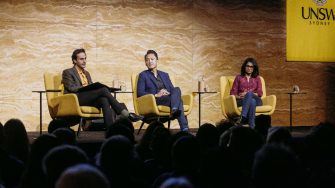Viet Thanh Nguyen’s novel The Sympathizer won the 2016 Pulitzer Prize for Fiction and is now an acclaimed HBO series. Shankari Chandran won Australia’s prestigious Miles Franklin Literary Award for her book Chai Time at Cinnamon Gardens in 2023.
Their latest works – Nguyen’s new memoir, A Man With Two Faces, and Chandran’s novel Safe Haven – show the realities of displacement. In a discussion that was in turn charming and confronting, the authors delved into the power of literature in uplifting the voices of refugees – and challenging the popular narrative.
‘The narrative that a refugee or immigrant is expected to tell is that you came from some war-stricken, poverty-stricken, famine-stricken hellhole … you’ve come to this country, and we know you’ve experienced racism, your parents have struggled, your grandparents have struggled, we apologised for everything we’ve put you through – but then look at you! You’ve become a success!’ said Nguyen. ‘You’ve won a Pulitzer Prize! You’re a living embodiment of the American Dream! And that’s the narrative that is expected to be told.
‘The challenge is always how do I, as a writer, refute that form that the refugee – or the immigrant or the minority – is supposed to pour themselves into?’
Chandran, who grew up as the child of Tamil Refugees from Sri Lanka in Australia and has a background in human rights law, wanted to interrogate the prevailing political spin in Australian refugee policy. ‘Why … was there this political narrative about asylum seekers that was so vicious, that was so lacking in compassion and in curiosity, that positioned them as a threat to the Australian way of life, and yet, this country is entirely made, with the exception of first nations people, of migrants, many of whom are refugees?’
She said that memoirs of asylum seekers held in detention centres under Australia’s offshore processing policy shaped her writing of Safe Haven.
‘There are tremendous memoirs written by people … who have survived terrible things, who left terrible things, and were then left in a detention centre and survived terrible things in these detention centres, and there are advocates who do an extraordinary job of speaking with them and for them – because many times these people are their own best advocates [and] we should be listening to their lived experience and we should be elevating their lived experience,’ she told the hundreds gathered in UNSW’s Leighton Hall.
Chandran said Kaldor Centre resources also informed the book, which resists a simple narrative of compassion or brutality.
‘I think fiction is an extraordinary tool with which – not to force people to look, but to invite people into looking, to help them feel uncomfortable; to give them the discomfort of what we do to each other, in the environment such as a novel, which is in fact actually inherently safe,’ she said.
'You are both safe and uncomfortable, you are safe and you must self-interrogate.’
Nguyen’s deeply personal memoir details his own experiences as the child of Vietnamese refugees who fled to the United States during the 1970s.
‘I went through a lot as a memoirist because I didn’t want to betray my parents, I didn’t want to betray these really deeply intimate personal stories that they would not have wanted to have exposed, and yet that I felt, needed to be told,’ he said.
Nguyen made an unconventional decision to in write in two voices, to better convey the story of his dual-identity experience as a child of refugees. Ranging from the unashamedly didactic to poetic to funny to stream-of-consciousness, Nguyen’s writing in A Man With Two Faces takes aim at racism, the contemporary treatment of refugees in the United States, and his own sense of self.
‘The challenge for a refugee writer is to find ways formally to refuse the expectations that are put us, and generally the expectations that are put on us are “show, don’t tell” because “We don’t want to hear your didactic lessons about our country. We just want to see stories of your sufferings which we can then absorb and feel better about ourselves and do absolutely nothing about,”’ Nguyen said.
Despite the stories of perilous conflict, displacement, overcoming adversity and courage that many refugees share, both Chandran and Nguyen emphasise this is an all-too-common experience many people have to endure.
‘I wanted to tell their story because I thought they were also not extraordinary,’ Nguyen said.
‘Everything that my parents have been through – 40 or 50 years of famine, warfare, colonization, racism, becoming refugees twice, rebuilding their lives twice – hundreds of thousands of Vietnamese people and other southeast Asian refugees did exactly the same thing.’
Nguyen said he did not want to apologise for refugees: ‘I want to say this is who we are – the good, the ugly all at once– and that’s what makes us as close to you as our humanity does.’
Listen to the full discussion in the event podcast.
For more information, contact the Kaldor Centre for International Refugee Law.

